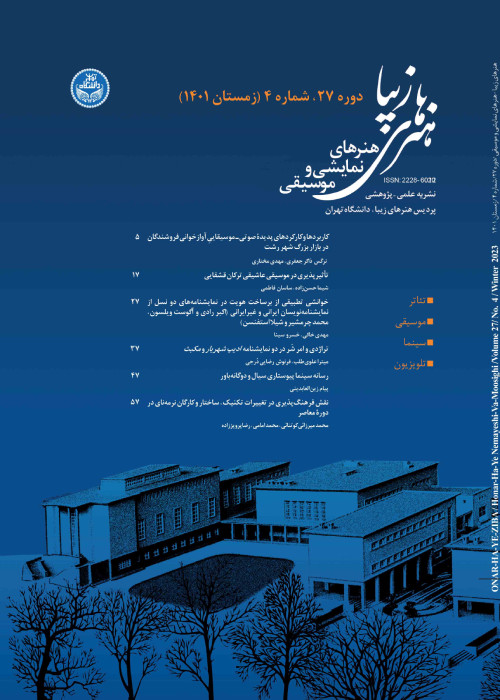Order of Discourses in the Death of Yazdgerd, based on fairclough,s Theory
Author(s):
Article Type:
Research/Original Article (دارای رتبه معتبر)
Abstract:
Abstract Some critics believe that for analyzing a text we should rely only on the text and there is no need to go far from it to the social condition and historical events. But Michel Foucault is the agent of those who consider the text as a result of social powers. Critical discourse analysis is a method by which we can conceive social and ideological aspect of texts of all types that never can be understand in other ways. The “Discursive order” or the “orders of discourse” is a critical term presented by Norman Fairclough means the contiguity of different discourses even opposed or paradoxical. Discursive order embodies different discourses in similar fields. The theory of critical discourse analysis (CDA) is based on Michel Foucault, the French philosopher. He believed that there is a relationship between the power and ideology with language and it can be found even in advertisements, essays, clinical recipe and artistic texts like poems, stories and literature as a whole. Fairclough expanded this idea and established a practical and systematic framework based on linguistic by which we can understand the juncture between power and ideological analogy with the language. In this essay we have chosen an Iranian play named “the death of Yazdgerd” written by Bahram Beizaee for analyzing in this method. This play is about “Yazdgerd”, the king of Sasani dynasty who escapes because of Arab’s assaulting and refuges to a mill and is killed by the miller. This is the historical narration about Yazdgerd, but we see many different possibilities about the end of Yazdgerd in the play. The miller, his wife and his daughter plays different stories about the king which we cannot distinguish which one is true. The idea about the splendid history of the Iranian kings and also the opposite opinion of this which is about the injustice of those kings configures two discourses: the discourse of royalty and majesty of the past history of kings and the discourse of opposing with the past and welcoming to the changes. The play is written in 1967 which is simultaneous with the Islamic revolution in Iran. We try to compare the most dominant discourses of the play with the political and social situation of the time in which the play has been written and focus about the “change” which is seen both in the play and in 1967 and falling down of the kings in the both period. The reason of this similarity in two different historical periods is the huge gap between people and the kings. So we first explains Fairclough’s theory in CDA and his frameworks, then we choose the most important questions of this framework about the play and try to answer them relying some facts in the play. To find the most dominant discourses in the text which is called order of discourses and interpreting the relationships between those discourses and the main discourses in the society which are determined by the ideology and power, is our next attempt.
Keywords:
Language:
Persian
Published:
Honar-Ha-Ye-Ziba: Honar-Ha-Ye Mosighi Va Namayeshi, Volume:24 Issue: 61, 2019
Pages:
15 to 24
magiran.com/p1964489
دانلود و مطالعه متن این مقاله با یکی از روشهای زیر امکان پذیر است:
اشتراک شخصی
با عضویت و پرداخت آنلاین حق اشتراک یکساله به مبلغ 1,390,000ريال میتوانید 70 عنوان مطلب دانلود کنید!
اشتراک سازمانی
به کتابخانه دانشگاه یا محل کار خود پیشنهاد کنید تا اشتراک سازمانی این پایگاه را برای دسترسی نامحدود همه کاربران به متن مطالب تهیه نمایند!
توجه!
- حق عضویت دریافتی صرف حمایت از نشریات عضو و نگهداری، تکمیل و توسعه مگیران میشود.
- پرداخت حق اشتراک و دانلود مقالات اجازه بازنشر آن در سایر رسانههای چاپی و دیجیتال را به کاربر نمیدهد.
دسترسی سراسری کاربران دانشگاه پیام نور!
اعضای هیئت علمی و دانشجویان دانشگاه پیام نور در سراسر کشور، در صورت ثبت نام با ایمیل دانشگاهی، تا پایان فروردین ماه 1403 به مقالات سایت دسترسی خواهند داشت!
In order to view content subscription is required
Personal subscription
Subscribe magiran.com for 70 € euros via PayPal and download 70 articles during a year.
Organization subscription
Please contact us to subscribe your university or library for unlimited access!


